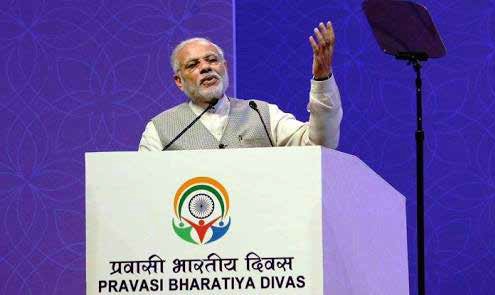By Siddharth Singh
For years, Indians viewed their countrymen who emigrated abroad for better opportunities with suspicion – as if they had somehow betrayed the motherland. But with roughly 25 million people of Indian origin now scattered across the globe – including more than 3 million in the US – attitudes about the Indian diaspora are changing dramatically. And in this context, Modi Govt in its tenure of last 2 and half years, has looked at the huge expatriate population – second only to China’s – as a valuable component of India’s foreign policy, in much the same way the Jewish diaspora in the US influences international opinion and policy on Israel. PM Modi has made a concerted effort to harness the energy and assets of Indian communities around the world.
The Diaspora communities have emerged as one of the important element of PM Modi’s foreign policy because they play a particularly important role in soft power diplomacy. The liberalization of Indian economy since 1991 has opened up opportunities for accelerating the development process and investments in India. The Diaspora has helped in increasing the bilateral trade and commercial relationship with a number of countries. The overseas Indians have been major catalysts in development of quality infrastructure. They have facilitated the entry of venture capital funds and they have also participated in various financial schemes like deposits in banks, shares, mutual funds etc. The finance professionals have helped in realizing the objective of making Mumbai an international financial centre. High-quality result oriented business outsourcing is yet another field of participation by the Diaspora. So Indian Diaspora is actually an asset in many sectors. They are the link to the flourishing markets across international borders. They make personal use of daily consumables from India, enjoy Indian movies, music and buy ornamental goods like art and craft. This not only opens up the Indian market abroad but also provides a platform for the cross country selling and trade.
To connect with all Indian Origin people, Government celebrates Pravasi Bharatiya Divas (PBD) on 9 January every year to strengthen the engagement of the overseas Indian community with the Government, reconnect them with their roots and celebrate their achievements and contributions. PBD is celebrated on January 9 as it was on this day in 1915 that Mahatma Gandhi, the greatest Pravasi, returned to India from South Africa to lead India’s freedom struggle. 13 PBD Conventions have been held in India so far. 14th PBD was held in January this year in Bengaluru, Karnataka.
PM Modi in his various speeches has always highlighted that India has always been a net giver of countless benefits to the world at large. This includes a productive migrant workforce that is also replenishing the homeland through the reverse process of “brain gain”. PM Modi has left no stone unturned to heap praise on the Indian diaspora because he sees them as ideal migrants in their host nations, investing sweat and blood to develop those countries. The main effect of this effort has been to remind host countries that people of Indian origin are invaluable assets to them. Modi has argued that bilateral relations between that host country and the Indian state are dynamized by this incomparable human resource factor. So without any hesitation it can be said that turning the Indian diaspora into an effective extension and tool of India’s foreign policy, is a key achievement of the Modi Doctrine. He has made numerous interaction with NRIs as a fundamental part of his foreign itineraries, no matter how small the diaspora community is. Modi Government’s machinery have thus added an extra layer of diplomacy for Indian interests in every corner of the globe.
In essence, the diaspora diplomacy of the Modi Doctrine has added to India’s international influence. It is a force multiplier that makes India’s presence in farflung parts of the world more coherent, organized and visible at the grassroots level. The benefits of people-topeople and public relations with the Indian diaspora, which has been stirred into action by Modi, are central to the Indian Prime Minister’s larger strategic objective of turning India into a “leading power” on the world stage.
The main reason behind Modi Govt’s push in connecting with Diaspora is that the 25 million strong Indian Diaspora has an impact on India’s foreign policy. They are an important factor in the bilateral relationship with the countries where they have a significant presence. They are the most important tool for India’s soft power diplomacy. Overseas Indians can be our unofficial ambassadors. They can play an important role in transforming India into a modern industrial State through knowledge power. Diaspora can also make useful contribution in much needed reforms in education sector. They are a major asset in transformation in the area of healthcare and also make India a hub of medical tourism. Diaspora philanthropy has played an important role in education, healthcare and rural development. No doubt the Diaspora also has major implications for India’s security.
Overseas Indians also benefit immensely from the standing of India in the international arena. Prestige and strength of India has a direct impact on the position of Diaspora in the countries of their settlement. In nutshell, the destinies of India and its Diaspora are intertwined. It is in the interest of both India and her Diaspora to develop a mutually beneficial relationship.
(Siddharth Singh is a student of International Studies in Jawaharlal Nehru University, New Delhi)
(The views expressed are the author's own and do not necessarily reflect the position of the organisation)

